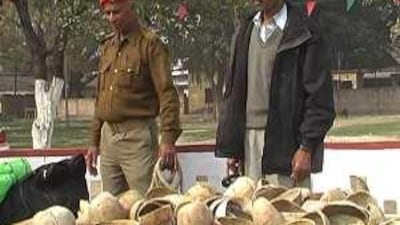PATNA, INDIA // Despite a ban on the export of human bones by the Indian government in the mid 1980s, the illegal trade is thriving in many parts of the country as a result of ineffective laws and poverty. Last week, Kamal Sah, 39, was caught carrying 67 human skulls and 10 bones on a bus in Chhapra, in Bihar state, by fellow passengers who had noticed a jagged bone sticking out of a bag beneath his seat. The capture of Mr Sah, who had been smuggling bones for more than 10 years, by civilians rather than police, underlines the authorities' failure to stamp out the practice. "He was caught accidentally. It is difficult to keep tabs on bone smugglers in these vast areas. We lack equipment, manpower and expertise to stop this practice," said Sudhir Kumar Chaturvedi, the investigating officer from Bhagwan Bazaar where Mr Sah was booked on charges of theft. The recovered bones were temporarily buried in the police station premises. According to the police, the consignment was destined for an agent working with Rajinder Hospital in the Siliguri district of West Bengal, which for centuries has been a hub in the human skeleton trade. Police said Mr Sah, a resident of Champaran in Bihar, had bought the skulls and bones from a cremation ground in Ballia in Uttar Pradesh for US$14 (Dh51). His confession statement revealed that the bones were to be sent to China to be used in the production of aphrodisiac drugs and then exported to Europe and the US. Even before the delivery, the hospital agent had made the full payment of $75. Police investigations confirmed Mr Sah's story. Chhapra police said Mr Sah's case was just one example of a big business. "This route has been used for smuggling human bones for a very long time. We made a few recoveries in the past few years and we are doing our best to stop smuggling," said Miklesh Kumar, the chief of Chhapra police station. Last September, in a routine check, Chhapra police arrested three individuals on a passenger bus bound for Siliguri, recovering 27 children's' skulls and 100 bones. "They prefer to smuggle skulls and bones in bags and in a very normal way. They travel in passenger buses and mix with people to avoid suspicion. They operate openly in these areas," said Mr Kumar. The abundance of human corpses and subsequent low cost for smugglers has made several cities in the north-west of the country popular for the illegal trade.
In 1985 the Indian government banned the export of human bones after human rights groups raised questions about how the bones were being collected, particularly in north-eastern areas of India, forcing the trade underground. Before the ban, traders legally purchased corpses from relatives of the dead before exporting the skeletons. Since then the trade has operated secretly. "There is no legitimacy to this trade, even the heir of the deceased has no right to raise money by selling the organs of the dead. The only exception is that certain parts of the dead body can be donated to authorised institutions or experts for medical research," said Majid Menon, a criminal lawyer. But the dire economic conditions for vast numbers of people living in such states as Bihar, West Bengal, Jharkhand and some parts of Uttar Pradesh, have favoured the bone smugglers. A cremation according to Hindu rituals can cost about $80, a figure beyond the reach of millions of poor people in India. Many of those who cannot afford a cremation dump their dead kin in rivers where smugglers lie in wait with fishing nets. The bodies are hidden in isolated places along the river bank and left to decompose before they are treated with hydrochloric acid and caustic soda to detach the remaining tissue from the bones. Five years ago police recovered about 1000 skulls from the banks of river Falgu in the ancient Buddhist town of Bodhgaya. The gangs also steal corpses from burning pyres in cremation grounds once the family members have left. Police in West Bengal arrested a gang of grave thieves a few years ago after dozens of graves were exhumed from Muslim cemeteries in Burdwan district. The incident angered the Muslim community and demands were made to provide police protection to cemeteries. Media reports claimed that the skeletons were sold to US bone dealers for $700 and were shipped via Bangladesh. Police have also accused hospital morgues for selling unclaimed corpses to smugglers. "It hardly matters for them. It's not just illegal, this is inhuman and unethical. "But these criminals consider money dearer to basic human values", said Mr Kumar. He said that in last four years 100 smugglers and grave diggers had been arrested in Chhapra. According to estimates, 20,000-25,000 human skeletons are smuggled out of India every year through Nepal, China and Bangladesh. The skeletons reach markets in the US, Japan, Europe and the Middle East, mostly for medical institutions. The price for a complete the skeleton in these markets ranges from $700 to $1500 depending on the quality and size. In India a full skeleton costs around $ 350 in the open market. Young Brothers, a Kolkata based bone dealer, sells a human skeleton for $300. While the complete skeletons mostly find their way to medical laboratories mostly in the West, the assorted bones and skulls are used for religious rituals mostly in Hindu and Buddhist dominated areas. As part of their tantric rituals, many tantriks drink wine in human skulls in places such as Nepal and Assam in India. jandrabi@thenational.ae

